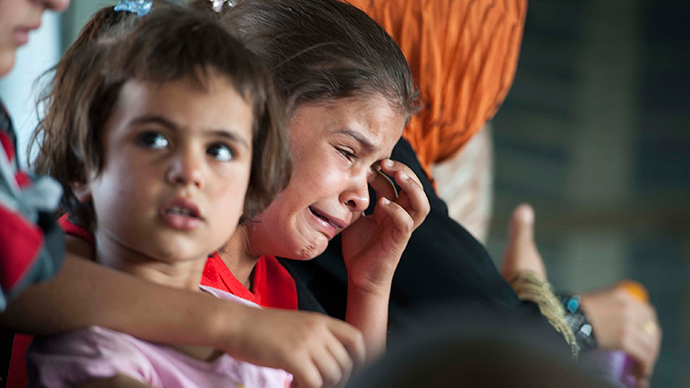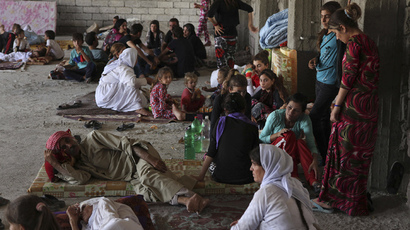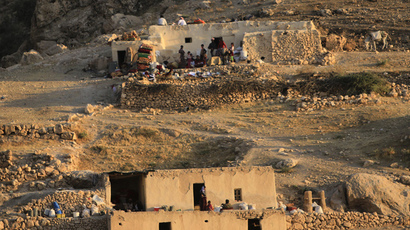Up to 700 Iraqi children killed, maimed or used as suicide bombers this year – UN envoy

Up to 700 children have been killed, mutilated, or used as suicide bombers in Iraq since the beginning of the year, UN envoy Leila Zerrougui said while briefing the Security Council on violations of children’s rights in armed conflicts worldwide.
“The images that we see through media reporting of indiscriminate and brutal killings of civilians, including children, are leaving us speechless and horrified,”said Zerrougui, the secretary-general's special representative for children and armed conflict, during a debate at the Security Council on Monday.
“Although the highly unstable security situation in the region slows our monitoring, we know that up to 700 children have been killed or maimed in Iraq since the beginning of the year, including in summary executions. I remain deeply concerned over recent reports of ISIL targeting minorities, including children and women, in the growing area under their control in Syria and Iraq,” Zerrougui said.
The Islamic State group has ordered boys as young as 13 years old to carry weapons, guard strategic locations, or arrest civilians, and has used other children as suicide bombers, the UN envoy added.
Other reports received by Zerrougui’s office suggest that militias allied to the Iraqi government have used children in the fight against Islamic State extremists. She added that the whereabouts of numerous children jailed on security charges by the Iraqi government remain unknown after militias stormed the facilities where they were held in July.
However, Zerrougui did inform the Security Council that some progress has been made around the world when it comes to protecting children in armed conflict. She mentioned Chad – which ended the recruitment of child soldiers – and Yemen, which signed a plan with the UN to prevent the recruitment of children in its armed forces.
The UN envoy did, however, stress that those gains have been overshadowed by the scale of violence against children in new crises – the Boko Haram insurgency in Nigeria and the conflicts in Libya, Afghanistan, the Central African Republic, Mali, and South Sudan.

She especially touched upon the current situation in Gaza, where more than 500 children were killed during the recent Israeli military operation. Up to 3,100 children were wounded in the attack. Moreover, about one-third of the injured children have become permanently disabled.
“The events in Gaza must be thoroughly investigated and identified perpetrators from all parties to the conflict must be held accountable. I cannot stress enough the urgent need to work towards a lasting peace. A ceasefire is only a temporary measure and we have been here before. The international community must put its weight behind addressing the root causes of this conflict,” Zerrougui told the Security Council.
In Nigeria, Zerrougui said, targeted attacks on schools, students, and teachers by Boko Haram killed at least 100 students and 70 teachers in 2013. The UN envoy also reported that more than 200 kidnapped girls are still in the hands of Boko Haram.
“I call on the government of Nigeria and its partners to take any and all measures to bring the girls back. We are now receiving reports that Boko Haram has recruited and used boys and girls as young as 12 years of age in their attacks, including in raids on schools. I am also worried by reports about grave violations perpetrated by armed elements allegedly associated with Government forces in northern Nigeria,” she said.
UNESCO’s special envoy for peace and reconciliation and Oscar-winning actor Forest Whitaker also took part in the Council’s session, after just returning from South Sudan. “Perhaps worst of all walking through the cities, I saw child soldiers wearing military uniforms and carrying guns,” he said.
Whitaker, who has worked with child soldiers for 10 years, said that supporting governments to end the recruitment of child soldiers is “a paramount first step.”
“It is impossible for us to comprehend the magnitude of a child soldier’s pain: how deep his wounds, how heavy her burden,” he said. “Unless we are there to meet them with open arms, open homes, and open schools, their wars will never end.”
Zerrougui also mentioned the global “Children, not Soldiers” campaign, launched jointly with UNICEF, which is aiming to make sure there are no children in any government forces by the end of 2016. In the past six months, she said, the campaign has received an almost overwhelming amount of support. She, together with Forest Whitaker, called on and welcomed all countries to join their efforts under the campaign. “I count on you, but more importantly, the child victims around the world count on you,” Zerrougui said.














